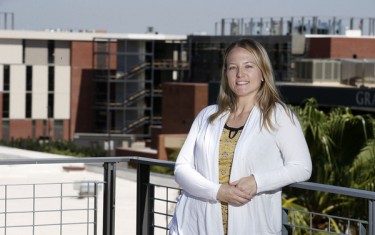By Michael Ferraresi
GCU News Bureau
The rapid-fire, precision-based dynamics of the daily grind at one of the largest high-tech companies in the U.S. shaped Dr. Melissa Trombley’s career — and eventually led to her first teaching job.
Trombley worked as a process and yield analysis engineer at Intel’s manufacturing facility in Chandler for 10 years before joining Grand Canyon University this spring as lead faculty in the new electrical engineering program. She had overseen elements of ion implantation on microchips and analyzed the effectiveness of massive, multimillion-dollar automated machinery on Intel's manufacturing lines, and saw an opportunity to share her knowledge with GCU’s first class of engineering students.
GCU’s bachelor’s degrees in biomedical, electrical and mechanical engineering open this fall. Trombley felt called to help shape the new academic programs and share the skills she learned on the manufacturing floor at Intel.
As engineering students will discover through hands-on, industry-oriented coursework, accuracy and precision guide everything in the workforce.
At Intel, Trombley worked on two types of ion implanters, each about the size of a bus. The 20 or so devices, which cost about $4 million each, generate the high-current ion particle beams that shape the silicon material for wafer-sized chips used in computers.
“If anything goes wrong, you’re going to scrap millions of dollars of material,” Trombley said. “If we touch them, we’ll ruin them. They all get handled by robotics, so you need to understand how to calibrate those robotics.”
Trombley began working with College of Science, Engineering and Technology associate dean Dr. Michael Sheller in February to help CSET faculty design curriculum and choose the high-tech equipment GCU’s engineering students will experiment with in their labs.
Equipment could include scanning electron or atomic force microscopes and optical devices such as electrometers and interferometers, for example, which allow engineers to measure electrical charges and the overlapping of energy wavelengths.
Although Trombley specializes in semiconductor electronics, she was required to learn other areas and interface with colleagues in overlapping disciplines, such as metrology, mechanical maintenance engineering and computer science.
Many students in traditional undergraduate engineering programs might not have a chance to experiment with equipment such as high-powered optical instruments until deep into their undergrad work or even into graduate school. But GCU has designed its programs to give students experience with the tools they’ll use in entry-level positions at companies such as Intel or at small startups. There, they’ll need to demonstrate technological versatility that is much broader than textbook understanding of scientific theories.
“I think it takes it to a whole other level when you’re looking at an actual piece of equipment that you’ll see at Intel or in grad school or anywhere in the field,” said Trombley, who earned engineering bachelor’s, master’s and doctoral degrees from Michigan Technological University.
Trombley will teach the introductory UNV-112, Success in Computer Science, Engineering and Technology, this fall but will also continue to develop coursework for core electrical engineering classes where students will dissect, reassemble and program circuit boards to understand how the instruments work for various tasks.
“I always get excited when I’m teaching things,” Trombley said. “I feel like I have a talent for taking a complex concept and breaking it down into simple terms.”
GCU faculty agreed. She aced the University’s “mini-teach” and, according to CSET faculty, clearly demonstrated the ability to convey the fundamentals of engineering in a classroom environment.
CSET faculty member Samantha Russell, who teaches statistics and is helping shape the electrical engineering curriculum, said Trombley already has shown a knack for conceptualizing projects as the college prepares for the engineering program’s launch.
“She’s just very open,” said Russell, who comes from an electrical engineering background and interned at Intel early in her career.
“She doesn’t make you feel that she’s above you,” Russell said. “Our students need that, to know that we’re on the same level as them. She genuinely cares about what she’s teaching.”
Trombley, whose 4-year-old daughter, Sonia, has accompanied her on various international journeys, including a recent mission trip to Ecuador during an Intel sabbatical, said she felt blessed to land at a Christian university where her experience can expose young people to engineering.
There is a need for ethics in a field where people can forget to put the public ahead of their companies’ bottom lines, she said. GCU’s values meshed with Trombley’s, and she recognized that the University was the type of environment she hoped to expose her daughter to as she grows up.
“I see this opportunity to teach her Christian values, and that we’re here to serve,” Trombley said. “I want her to grow up in service to others like that.”
Reach Michael Ferraresi at 602-639-7030 or [email protected].










































































